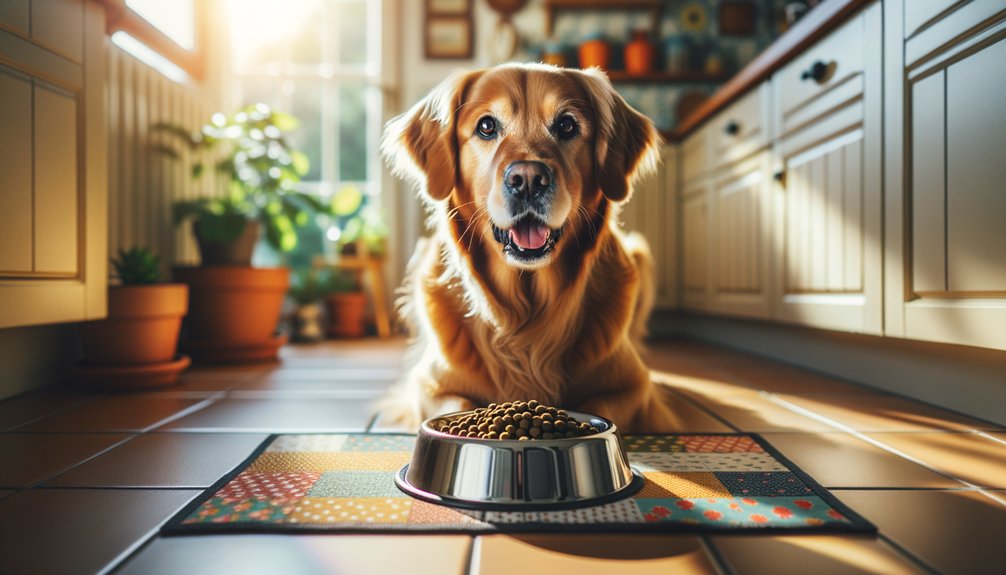AI-assisted
Last updated on May 17, 2025
Feeding dogs once a day is a practice that can have both benefits and drawbacks, depending on various factors such as breed, age, and health conditions. While some dogs may thrive on this schedule, experiencing improved weight management and stable metabolism, others may suffer from digestive issues or energy fluctuations due to inadequate meal frequency. Understanding the implications of this feeding routine is essential for any dog owner contemplating this approach. What factors should be considered before making this decision? Many dog owners wonder if feeding their pets once a day is healthy, but the answer depends on several crucial factors.
Key Takeaways
- Feeding dogs once a day may promote stable metabolism and reduce obesity risk, but individual needs must be evaluated.
- Some dogs may require multiple meals for energy, especially if they are active or have specific health conditions.
- Once-a-day feeding simplifies meal preparation and aids in portion control, aligning with busy lifestyles.
- Risk of digestive issues can increase with larger single meals, highlighting the need for individual dietary assessment.
- Consultation with a veterinarian is recommended to determine the best feeding frequency for optimal health.
Is Once-a-Day Feeding the Right Choice for Your Dog’s Health?

When considering the health implications of feeding dogs once a day, one must evaluate various factors that can influence a dog’s nutritional needs and overall well-being.
The practice of feeding once a day may offer benefits, such as promoting a more stable metabolism and reducing the risk of obesity, particularly when contrasted with feeding twice a day.
However, dog nutrition is highly individualized; factors such as age, activity level, and specific health conditions must be taken into account.
An ideal dog diet is essential for maintaining canine health, and some dogs may thrive better with multiple meals.
Ultimately, owners should consult with veterinarians to determine the most suitable feeding schedule, ensuring their dog’s health and nutritional requirements are adequately met.
The Pros and Cons of Feeding Your Dog Once Daily
Feeding dogs once daily presents both advantages and disadvantages that merit thorough examination.
One meal per day can simplify meal preparation while promoting portion control, potentially aiding in weight management. Additionally, some owners may find that a reduced meal frequency aligns with their busy lifestyles, allowing for a more structured routine.
Feeding dogs once daily can streamline meal prep and support weight management, fitting seamlessly into busy lifestyles.
However, this practice may not suit all dogs, as some breeds or individual pets may require multiple meals to maintain energy levels and prevent digestive issues. Moreover, adhering to dog health guidelines is essential, as skipping meals can lead to health complications.
Ultimately, while the health benefits of daily feeding may appeal to some, it is important to evaluate each dog’s unique needs and preferences when determining the appropriate feeding schedule.
How Does Feeding Dogs Once a Day Affect Their Well-Being?
How does the practice of feeding dogs once a day influence their overall well-being?
Feeding dogs once daily can markedly impact their health, particularly concerning their nutritional requirements and portion control. A single meal may lead to fluctuations in energy levels, as dogs might experience hunger or fullness inconsistently throughout the day.
Additionally, a canine diet that doesn’t align with the dog’s specific needs could result in weight management challenges and digestive issues. Dog feeding practices that prioritize a balanced diet are vital for maintaining ideal health.
While some dogs may adapt well to this routine, others might require more frequent feeding to meet their energy demands. Ultimately, understanding these factors is important for responsible dog care and nutrition.
Is a Single Meal a Day Healthy for Your Dog’s Diet?
Determining whether a single meal a day is healthy for a dog’s diet requires careful consideration of various factors, particularly the dog’s size, age, activity level, and specific health needs.
While some proponents of a dog feeding schedule advocate for once-a-day feeding, emphasizing its simplicity, others suggest twice-a-day feeding as a means to improve daily dog nutrition.
Some advocate for once-a-day feeding for its simplicity, while others recommend twice daily for better nutrition.
The frequency of feeding can greatly impact canine nutrition, as different dogs may benefit from varied feeding frequencies based on their individual characteristics.
For instance, dogs with high energy levels may fare better with multiple meals, thereby avoiding potential digestive issues associated with larger portions.
Ultimately, evaluating the benefits of different dog feeding frequencies remains essential for optimizing each dog’s nutritional intake.
Understanding the Health Implications of Once-a-Day Dog Feeding
When considering the health implications of once-a-day dog feeding, it is vital to recognize that this practice can yield both benefits and potential drawbacks, depending on the individual dog’s circumstances. Veterinarians often encounter pet owners questioning, “Should I feed my dog once daily?” While dogs can adapt to a once-a-day feeding schedule over time, it is vital to guarantee it provides adequate nutrition. Furthermore, feeding a dog once daily may lead to weight gain if portions are excessive, creating a dilemma between smaller meals versus a larger single meal. The following table outlines some key aspects of this feeding approach:
| Aspect | Details |
| Adaptation | Dogs can adjust over time to single meals. |
| Nutrition | Must guarantee adequate nutrition in one meal. |
| Weight Management | Portions must be controlled to prevent weight gain. |
| Meal Frequency | Smaller meals may promote better digestion. |
| Owner Convenience | Once-a-day feeding can simplify scheduling. |
Frequently Asked Questions
Can Puppies Be Fed Once a Day?
Puppies, being in a critical growth phase, typically require more frequent feeding than once a day.
Experts generally recommend feeding them three to four times daily to guarantee they receive adequate nutrients for development.
A single daily meal may not provide sufficient energy or nourishment, potentially leading to health issues.
Consequently, it is advisable to follow a structured feeding schedule that aligns with a puppy’s specific age, size, and nutritional needs for ideal growth.
How Do I Transition My Dog to Once-A-Day Feeding?
To change a dog to once-a-day feeding, one should gradually reduce the frequency of meals.
Initially, the owner can replace one meal with a slightly larger portion at the remaining meal. Over the course of several days, this adjustment allows the dog’s digestive system to adapt.
Monitoring the dog’s weight and overall health during this change is essential, as some dogs may require more frequent feedings due to their specific dietary needs or activity levels.
What if My Dog Doesn’t Finish Their Food?
When a dog does not finish its food, several factors may contribute to this behavior, including the dog’s appetite, the quality of the food, or potential health issues.
It is essential for owners to monitor their pet’s eating habits and consult a veterinarian if this behavior persists, as it could indicate underlying health concerns.
Additionally, adjusting portion sizes or feeding schedules may help encourage complete consumption of the provided meals.
Are Certain Dog Breeds Better Suited for Once-A-Day Feeding?
Certain dog breeds exhibit varying adaptability to a once-a-day feeding schedule, often influenced by their size, metabolism, and energy levels.
Larger breeds, such as Great Danes, may benefit from this frequency due to their slower digestion, while smaller, more active breeds, like Jack Russell Terriers, may require more frequent meals to maintain energy levels.
Ultimately, individual health considerations and lifestyle factors should guide owners in determining the most suitable feeding regimen for their specific breed.
How Does Age Affect a Dog’s Feeding Frequency?
Age considerably influences a dog’s feeding frequency, with puppies typically requiring multiple meals per day to support their rapid growth and energy levels.
Whereas adult dogs generally thrive on two meals daily. Senior dogs may also benefit from more frequent, smaller meals to accommodate their slower metabolism and potential digestive issues.
Adjusting feeding schedules according to age helps guarantee nutritional needs are met, promoting overall health and well-being throughout a dog’s life stages.
Conclusion
In summary, while feeding dogs once a day can be beneficial for certain breeds and individual dogs, it is essential to recognize that this approach is not universally applicable. Owners must consider factors such as age, activity level, and specific health conditions, which may dictate different feeding requirements. As a result, rather than viewing once-a-day feeding as a one-size-fits-all solution, it is vital to consult a veterinarian to guarantee that a dog’s unique nutritional needs are met effectively.



